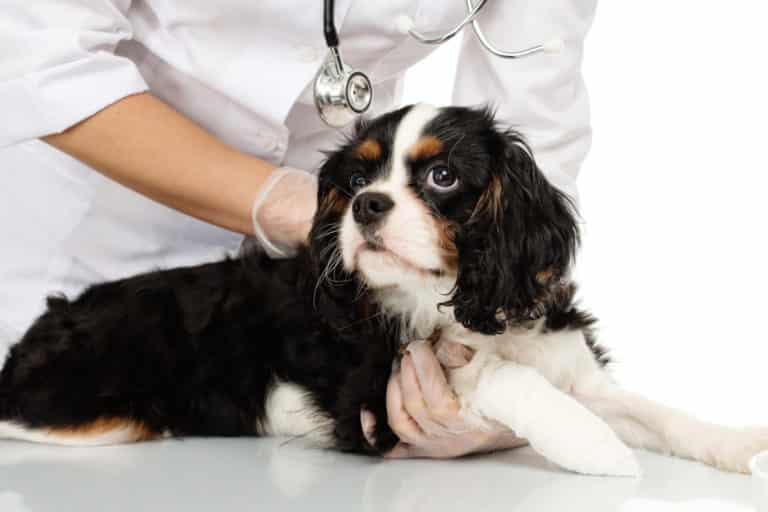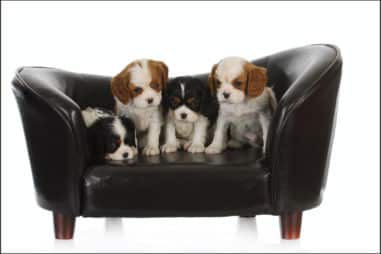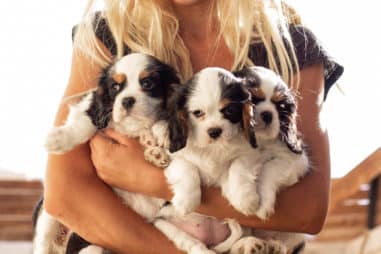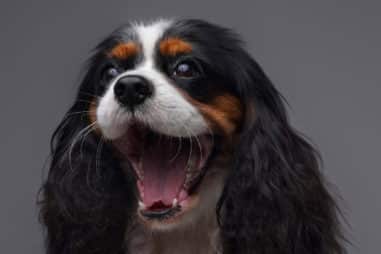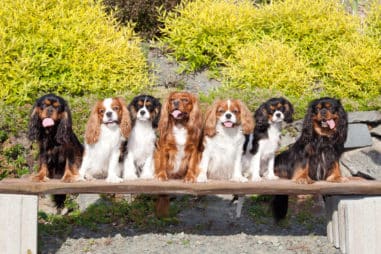Smaller dog breeds live longer lives than larger ones. Cavaliers are fortunate enough to be one of the smaller ones, so you can spend more time with them!
But there are hindrances to their long lives, 25 of them to be exact. They have many genetically inherited diseases. Some of which are mild, while others are fatal.
Buying from reputable breeders can help you get a healthy Cavalier. But they can still develop health issues at least once in their lives.
With this read, you should know what to expect when caring for your Cavalier health-wise. This can help you take quick actions when they need it. Keep reading to know what health issues you should watch out for in Cavaliers.
Do Cavalier King Charles Spaniels Have a Lot of Health Problems?
Cavaliers are prone to several health issues. These vary in severity, some are minor such as patellar luxation. While others are more serious, like mitral valve disease (MVD).
Unfortunately, many of these are hard to avoid as they are genetically inherited. But if you buy from a reputable breeder, you have a lower chance of getting a Cavalier that has these.
Some do health tests on their puppies to check for inheritable diseases. This also helps get their puppies an early diagnosis and intervention.
Make sure to ask your breeder for health certificates as well. Take your Cavalier to the vet too so they get a clean bill of health.
What Health Problems Do Cavalier King Charles Spaniels Have?
Mitral valve disease is the most worrying health issue that Cavaliers face. But there are other problems that they can suffer from. As they say, prevention is better than cure, so you should know what to watch out for.
To help you out, here are the common health issues that Cavalier King Charles Spaniels have.
Mitral Valve Disease
This condition occurs when one of the heart’s valves deteriorates. At first, it can start as a heart murmur, but it progresses into heart failure.
Cavaliers are 20 times more likely to have MVD than other dog breeds. With this, you should take your Cavalier on regular screenings for a heart murmur. This should be when they are one year old onwards.
When your Cavalier has trouble breathing or is panting, you should see your vet as soon as possible.
Syringomyelia
This is another serious condition in Cavaliers, affecting their brains and spinal cords. Syringomyelia occurs when cerebrospinal fluid enters the spinal cord, creating a cavity.
Symptoms include mobility issues, pain when moving their necks, crying, and yelping. Cavaliers who suffer from this will also wobble while walking.
According to research, 70 percent of Cavaliers have symptoms of syringomyelia by the time they are six years old. This has no cure and the treatment involves managing their pain through medication.
Hip Dysplasia
Although common in larger breeds, Cavaliers are prone to this health issue. This condition occurs when their hip joints become unstable or loose.
Cavaliers who suffer from this have mobility issues, stiffness, or trouble jumping. These are only a few of the symptoms that hip dysplasia has. But this can negatively impact their quality of life.
There are many treatment options for Cavaliers who have hip dysplasia. Losing weight and restricting their exercise are the simplest ones. But in severe cases, they may need surgery.
Patellar Luxation
This health issue occurs when your Cavalier’s kneecap becomes dislocated, causing pain. Like hyp dysplasia, this also causes mobility issues.
Intervertebral Disc Disease
IVDD is a degenerative condition where the discs of their vertebrae slip. Although this health issue is age-related, Cavaliers of any age can develop this.
Symptoms include lameness, stiff necks, reluctance to move, and in severe cases, paralysis. Dog breeds that are small and long are prone to this, like Cavaliers.
With this, weight management is crucial to help prevent and manage IVDD. Excess weight puts pressure on their spine, exacerbating the issue.
Eye Problems
Unfortunately, the beautiful doe eyes of Cavaliers are prone to problems too. Cavaliers can suffer from conjunctivitis and keratoconjunctivitis sicca.
Conjunctivitis or “cherry eye” makes their eyes red and inflamed. It occurs when the conjunctiva, the covering of their third eyelid, becomes infected. Other symptoms include excessive blinking, eye discharge, and squinting.
Keratoconjunctivitis sicca or “dry eye” occurs when their eyes become inflamed from drying. This dryness is due to the lack of aqueous tear film on their eye surface. The specific parts affected are their cornea and the surrounding tissues.
Ear Infections
A Cavalier’s long ears are their crowning glory, but these are prone to painful infections. This can be serious and even chronic in Cavaliers.
Because their ear droops, there is a lack of airflow in their ear canals. This makes it hard for their ears to dry. With humidity, dirt, and bacteria in their ears, this often leads to infections.
Oral Problems
Smaller dogs like Cavaliers often have crowded teeth. They have the same number of teeth as larger dogs, crammed into their small jaws. Food particles, debris, and even bacteria easily get trapped in their mouths.
The lack of oral hygiene can cause plaque and tartar buildup. If left alone, this can progress to gingivitis and even periodontal disease. This is why you need to brush your Cavalier’s teeth at least once a week.
Are Cavalier King Charles Spaniels Anxious?
Cavaliers can love the company of their humans so much that they become anxious when you are not with them. They can be velcro dogs, following you around the house as if they are your shadow. With this, they are prone to separation anxiety.
Separation anxiety causes your Cavalier to be in great distress when they are alone. This is the root of many unwanted behaviors, such as excessive barking and whining. This can even cause destructive behaviors, like chewing on furniture and scratching floors.
Because of this, Cavaliers are not suited for you if you work long hours each day. But if you are willing to put in work, you can train your Cavalier to become more independent. Or, you can leave them at doggy daycare while you are at work.
There are many workarounds for separation anxiety. If your Cavalier suffers from this, they can overcome their anxiety with your help and lots of love.
Do Cavalier King Charles Spaniels Have Breathing Problems?
Since Cavaliers are a brachycephalic breed, breathing can be difficult for them. They have smaller nostrils and narrow tracheas that obstruct their airways.
Because of this, it is hard for them to cool down during warmer seasons, making them prone to overheating. Overheating can also occur with intense exercise, so be careful during playtime. Loud breathing and excessive panting are some of the signs to stop playing.
Why Do Cavalier King Charles Spaniels Lick So Much?
Cavaliers are a lovey-dovey breed, so they may lick you as a sign of affection more than other breeds. Other times, they may do it because they want to know where you were. They have great taste buds, so they even know if you have played with other dogs by licking you.
A silly reason why they lick you is that they like how you taste! Human skin is salty, especially when you sweat. They enjoy this taste and will lick you for fun.
Or, it could be that your Cavalier is trying to tell you something. This is one of their ways of communicating with you, other than barking. They may be asking for food, playtime, or to go out to poop or pee.
But of course, there may be a scarier reason behind their excessive licking. It could mean any of the following:
- Boredom
- Anxiety
- Pain
- Infections
- Allergies
If you think their licking is due to boredom, spend more time with your Cavalier and this should improve. But if it does not go away, you need to look at the other reasons on the list.
Separation anxiety can cause this obsessive licking for them to soothe themselves. But general anxiety can also cause this, like having a new pet in the home. Or it can be due to moving houses.
Any changes in your Cavalier’s routine or environment can trigger excessive licking.
If your Cavalier licks themselves too much, it can be due to the latter three on the list. Licking is self-soothing and is a way for them to clean their wounds. With this, it is best to take your Cavalier to the vet so they get proper treatment.
Why Do Cavalier King Charles Spaniels Lick the Air?
Air licking can mean many things, from boosting their sense of smell to health issues. This is an odd sight to behold because they are licking nothing. So if your Cavalier does this, it is natural for you to wonder why.
Since this can be a sign of something serious, figuring out the reason for this behavior is important. So below is a list of all the possible reasons for air licking in Cavaliers.
The Flehmen Response
The Flehmen response is your Cavalier’s way to boost their sense of smell. It is no surprise that dogs have way a better sense of smell than humans. This is due to their vomeronasal organ, found in their nasal cavity.
This organ connects to the roof of their mouths, on the back of their front teeth.
By licking the air, your Cavalier can open their vomeronasal organs. This action brings in scents towards the vomeronasal organ to improve its smell.
A Sign of Enjoyment
If your Cavalier licks the air when you scratch them, it means that they enjoy this. This is like when they move their back legs when you scratch the sweet spot. So keep on scratching, they are loving it!
They Want Food or Water
When you are cooking, your Cavalier gets excited about mealtime. So they lick the air for them to smell your delicious cooking! They can also lick the air when you feed them something sticky, like peanut butter.
But this can also mean that they need water. When their mouths are dry, they will start licking the air. So make sure they always have access to clean drinking water.
Seeking Your Attention
You may have trained your Cavalier to do this by accident. If you spring to action whenever they lick the air, they learn that this gets your attention. Cavaliers are smart and love spending time with you, so they may do this once they figure it out.
Something Is Stuck in Their Mouth
This can be due to the peanut butter treat that you gave them. But other foreign objects, like a bone, are dangerous when stuck in their mouth. It can also be pieces of their broken toy.
If you suspect that this is what happened, you need to remove the object right away. But your vet can also help you if you find this hard to do at home.
Responding to Stress
Many things stress your Cavalier out. The loud sound of vacuums, fireworks, and even cars. They may respond by barking, but they can also respond with air licks.
The key here is to watch for your Cavalier’s body language. If they lick the air with their tail between their legs and ears flat on their head, this is their stress response. Otherwise, the air licking may be due to something else.
Dental Issues
Any pain in their mouth can cause this odd behavior. It can be a loose tooth, cavities, infection, or dental disease. Licking the air is their attempt to soothe themselves.
With this issue, you may also notice that they drool more or have bad breath. They may also be reluctant to eat their meals. So take them to the vet right away when you see these symptoms.
Obsessive Compulsive Disorder
Dogs can also suffer from OCD and this manifests in many ways, like repetitive air licking. In severe cases, this can be harmful to your Cavalier. They may lick the air to the point of drying their tongue, making it crack.
Unfortunately, Cavaliers have a predisposition to compulsive disorders. So you need to consult with an expert, like an animal behaviorist, to help your Cavalier.
Health Problems
Some health issues can make your Cavalier lick the air. The most common one is gastrointestinal problems. With GI issues, they get obsessed with licking surfaces and even the air.
Other health issues that can explain this behavior are the following:
- Cognitive Dysfunctions (Alzheimer’s or Dementia)
- Pancreatitis
- Esophagitis
- Partial Seizures
What Is the Average Lifespan of a Cavalier King Charles Spaniel?
The estimated lifespan of Cavaliers is between 9 and 14 years. But the average lifespan is quite short, at 9.75 years. Many Cavaliers earn their wings early due to genetically inherited diseases.
Cavaliers inherit 25 genetic disorders. This makes them prone to developing something for the duration of their lives. So if you want your Cavalier to live a long life, caring for their health is vital.
Their lifespan depends on their genetics, health care, and the environment they have. Prevention and regular checkups will help you catch any disorders early on. This gives your Cavalier a better chance at treatment.
What Is a Good Age for a Cavalier King Charles Spaniel?
Small breeds like Cavaliers become seniors when they are 10 to 12 years of age. When they reach this age, they had a good, long life. Although they are prone to many health issues, it is not unusual for this breed to reach seniority.
Is 10 Old for a Cavalier King Charles Spaniel?
At 10 years old, your Cavalier is already a senior dog. With their age, they are more prone to health issues, like arthritis. They also slow down and become more inactive.
But this does not mean that they do not need exercise. This is still crucial to help them live longer and avoid problems with their health. Also, they may need a change of diet too that is appropriate for their age.
For these, you should consult your vet on what to do. Senior dogs have different needs. So you need to come up with an exercise and diet plan specific for your Cavalier.
What Is the Oldest Living Cavalier King Charles Spaniel?
The oldest Cavalier to live is Tuppence, at 19 years and 4 months old. Tuppence surpassed the life expectancy of Cavaliers by five more years. This shows that Cavaliers can live long lives when bred with their best possible health in mind.
How Do Most Cavalier King Charles Spaniels Die?
The leading cause of Cavalier fatalities is heart failure, especially in older ones. This heart failure is a result of mitral valve disease, which Cavaliers are prone to.
The prevalence of death by heart failure in Cavaliers is 30.6%. For other breeds, this is at 7.82%. With this huge gap, this is something owners and potential owners of this breed should know.

